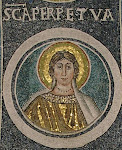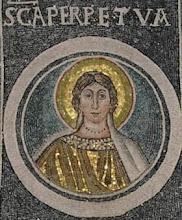Despite the claims of some, the conviction of the uniqueness of Jesus Christ as Lord and God and the absolute imperative of evangelism are not in dispute in the common life of the Communion.Although this is a case of defining deviancy down, at least it is a clear statement that can be assessed. That is, it is a clear and clearly false statement. Below I will demonstrate that there are dioceses of the Anglican Communion which include within their common life:
1) doubts or rejection of the uniqueness of Jesus Christ as Lord and God, and/ or
2) doubts or rejection of the absolute imperative of evangelism.
If the information I provide below were presented to ++Rowan, would he withdraw the invitations of the bishops of those dioceses to Lambeth? If he would not withdraw the invitations of such bishops to Lambeth, than isn't he permitting the dispute of the uniqueness of Jesus Christ as Lord and God and the absolute imperative of evangelism within the common life of the Communion.
DISPUTING THE UNIQUENESS OF JESUS CHRIST AS LORD AND GOD
Arizona (Bishop Kirk S. Smith)
Has at least two churches that dispute the Lordship of Christ. Grace St. Paul's prominent rector denied Jesus Christ is Lord and at Tucson's largest Episcopal church, St. Philip's in the Hills, associate rector Susan Anderson-Smith has revised the liturgy to exclude references to Lord.
Niagra (Bishop Michael Bird) The June 2008 issue of the Niagra Anglican, the official publication of the diocese, the article beginning on the front page titled "Time for a Christian Truce" by Christopher M. Grabiec, editor, argues that although Arius believed that Jesus was a created being and hence in some ways inferior to God, no one really knows if Arius was right or wrong and it doesn't matter.
Northern California (Bishop Barry Beisner) -- During Advent 2007, invited Buddhist monks to construct a healing Medicine Buddha mandala and chant and pray to it in Trinity Episcopal Cathedral.
Northern Michigan
September 2007 Diocesan Newsletter proclaims a theology in which all persons are the living Christ.
Pennsylvania (Bishop Charles Bennison)
During Epiphany 2007-8, invited a Buddhist monk to construct a Buddhist mandala depicting Jesus and Buddha as equals at Philadelphia Episcopal Cathedral.
DISPUTING THE ABSOLUTE IMPERATIVE OF EVANGELISM
Los Angeles (Bishop Jon Bruno) -- Wrote a proclamation which was read at St. John’s Cathedral renouncing the proselytizing of Hindus and apologizing for such efforts in the past:
During the service, the Rt. Rev. J. Jon Bruno, bishop of the Episcopal Diocese of Los Angeles, issued a statement of apology to the Hindu religious community for centuries-old acts of religious discrimination by Christians, including attempts to convert them.
“I believe that the world cannot afford for us to repeat the errors of our past, in which we sought to dominate rather than to serve,” Bruno said in a statement read by the Rt. Rev. Chester Talton. “In this spirit, and in order to take another step in building trust between our two great religious traditions, I offer a sincere apology to the Hindu religious community.”
The bishop also said he was committed to renouncing “proselytizing” of Hindus. Bruno had been scheduled to read the statement himself, but a death of a close family friend prevented him from attending the service.
H/T Stand Firm, Peter Ould , MCJ





5 comments:
Seven examples of something wrong, no doubt about it. Discipline and accountability really do need to kick in with cases of Anomic Anglicanism. The fact that it does not in these cases drives me crazy!
But I still have questions.
For instance, what percentage of the whole Episcopal Church do these seven examples represent? And on what basis do we really know that these seven examples are representative of the whole?
On what basis do these examples prove that entire dioceses (meaning every single baptized man, woman, and child within those dioceses) doubt or reject the uniqueness of Jesus Christ as Lord and his divinity or doubt/reject the evangelical imperative?
And is there convincing if not irrefutable empirical evidence to show that these seven examples are representative of the majority if not the whole of the Episcopal Church? If that body of empirical evidence exists, where can we find it? And who conducted the research using what methodology, and using what kinds of samples?
If we can't give sound, persuasive answers to these sorts of questions, then in spite of the reality that these seven examples are deeply troublesome and should be addressed, we run the very real risk of falling into the fallacy of converse accident.
Hi Bryan+,
I think they are "in dispute in the common life of the Communion" if they are rejected by religious leadership (ministers and lay leaders) in churches, cathedrals and diocesan newsletters.
I don't think they can only be said to be in dispute when the majority of the Episcopal and Canadian Church reject them.
Thank you for directing us to Anomic Anglicanism.
Dear Perpetua,
I'm inclined to say that your response begs my questions. While we need to take seriously the things that go over the cliff when it comes to the norms and boundaries that govern our common life as Episcopalians/Anglicans, we also need to be wary of hasty, unwarranted generalizations. Without some pretty massive, persuasive empirical research that goes well beyond seven examples, our concerns collapse into a fallacy.
Having said that, I will also say that I appreciate your effort (and those of others) to document this kind of boundaryless, normless, and theologically vacuous stuff. It really does drive me nutty (can you tell?).
In addition to the original posting entitled "Anomic Anglicanism," here are the other postings on my blog where I've touched on cases of Anomic Anglicanism.
It appears that the link to my other postings on Anomic Anglicanism did not work, so let's try it again.
Bryan's question is a good one, and it points to the need for better reporting from the people in the pew. Most of us are in a daze on Sundays and follow the rector's lead. So he strikes out the word Lord?. Okay, then we have to call the Lord's Prayer "Jesus' Prayer Advice," or the "Our Higher Power Prayer," etc. The Bishop may get to hear about these shenanigans from concerned parishoners, but the reporter from the pew does not usually see any changes (except perhaps becoming labelled heretics ourselves and being banished to the outermost realms of the www).
I appreciate the www and how it might serve as a tool to keep such behavior (as Perpetua documents) in check. The fact that it is going on at all, and that the Archbishop does not acknowledge it is very troubling.
I decided to help the AoC by rewriting his comments into a less understandable style,
"the lack of conviction of the uniqueness of Jesus Christ as Lord and God and and lack of the absolute imperative of evangelism are not uncommonly in dispute in the common life of the Communion."
Post a Comment